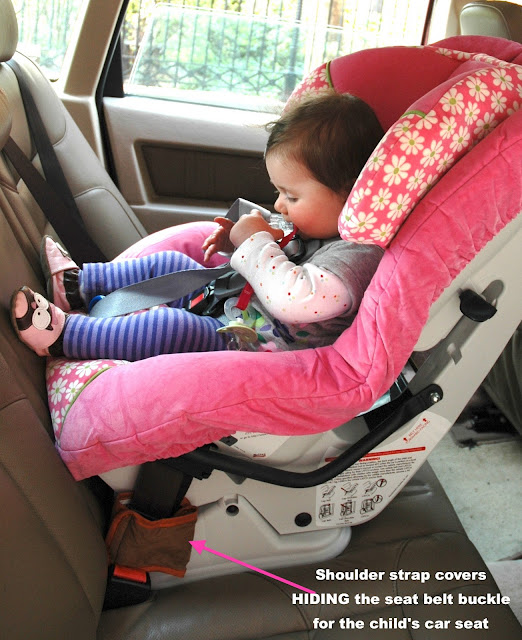How to help a child with asperger syndrome
5 Tips for Raising a Child with Asperger's Syndrome
Parenthood looks a little different when you’re raising a child with Asperger’s Syndrome. So much more than some label, Asperger’s Syndrome colors how a child sees and experiences the world. For these children, nothing is obvious or to be taken for granted. And it’s up to parents to be sensitive and mindful of these unique challenges.
Asperger’s Syndrome changes what it means to be a parent. This condition forces parents to accept that they’re preparing their child for a world that may not always understand them. The good news is that many with Asperger’s Syndrome do go on to lead fulfilling lives.
Diagnosing Asperger’s Syndrome
Asperger’s Syndrome is often dismissed as high-functioning autism. This dismisses the uniqueness of the condition. In 1994, Asperger’s Syndrome was officially added to the American Psychiatric Association’s Diagnostic and Statistical Manual of Mental Disorder. This was the first time there was an official acknowledgement that Asperger’s Syndrome is its own condition separate from autism.
However, this all changed in 2013 when much to the dismay of many with Asperger’s Syndrome, the DSM-5 decided to redefine autism, Asperger’s Syndrome and other developmental disorders with the blanket diagnosis autism spectrum disorder. This makes collecting accurate data about Asperger’s Syndrome difficult as the condition is sometimes diagnosed as autism or autism spectrum disorder but other times as Asperger’s Syndrome.
It isn’t always easy to diagnose Asperger’s Syndrome largely due to a lack of standardized screening. While the condition is often identified in childhood, many only receive a diagnosis as adults. Often the condition is diagnosed in adults looking for treatment for other health issues like depression and obsessive compulsive disorder. With early intervention and the correct behavioral management strategies, most people with Asperger’s Syndrome go on to lead independent lives.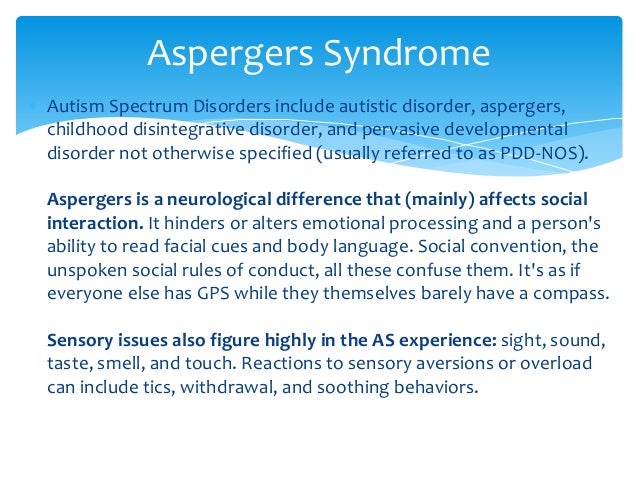 Many do manage to adapt to the challenges of daily life, find employment, and even enjoy fulfilling relationships.
Many do manage to adapt to the challenges of daily life, find employment, and even enjoy fulfilling relationships.
Learn More about AngelSense and how it helps to promote independence and support employment
What’s the difference between Asperger’s Syndrome and autism?
Children with Asperger’s Syndrome often don’t have the same developmental delays or difficulties as those with autism. This is why children with the condition are considered to have high-functioning autism. What’s interesting about children with Asperger’s Syndrome is that they tend to have a high IQ and can learn new things with ease. They also often have good language skills unlike people with autism.
Tips for raising a child with Asperger’s Syndrome
Parenting is one of the toughest jobs in the world, and perhaps the only one that comes without a guidebook or well-documented protocol. Parenting a child with Asperger’s Syndrome is doubly challenging, and while we don’t claim to have all the answers these tips may come in handy. At the very least, our hope is that these tips will give you the peace of mind to know that you’re doing everything you can to raise a happy and well-adjusted child.
At the very least, our hope is that these tips will give you the peace of mind to know that you’re doing everything you can to raise a happy and well-adjusted child.
1. Teach practical social skills
Children with Asperger’s Syndrome find social interaction particularly challenging because they’re often unable to understand the subtleties of body language and tone of voice. More often than not, these children will misread these situations, appearing awkward and even socially inappropriate.
It’s important to teach children to correctly identify social cues and body language. In addition, these children need to spend time practicing the social norms that govern social interaction. This includes maintaining an appropriate social distance and making eye contact. It’s also important to work on understanding nonliteral language as this makes up a large part of daily interaction, and is something people with Asperger’s find especially challenging.
How can I help my child improve their social skills today?
Teach your child a few conversation starters to help them interact with others. This can include things like What is your name? or Can I sit with you?
2. Work on your child’s problem solving skills
Problem solving skills can help a child better understand social norms and how to react in difficult social situations. A large part of enhancing a child’s problem solving skills involves helping them to correctly identify what’s wrong in different situations. This is a good way to teach your child about cause and effect and the power that actions can have in the world.
Parents should keep in mind that while there isn’t only one way to solve a problem, this is a skill that children with Asperger’s Syndrome need to practice as often as possible. By incorporating problem solving as part of your child’s daily life, your child will develop the confidence to respond calmly when they have to problem solve in real life.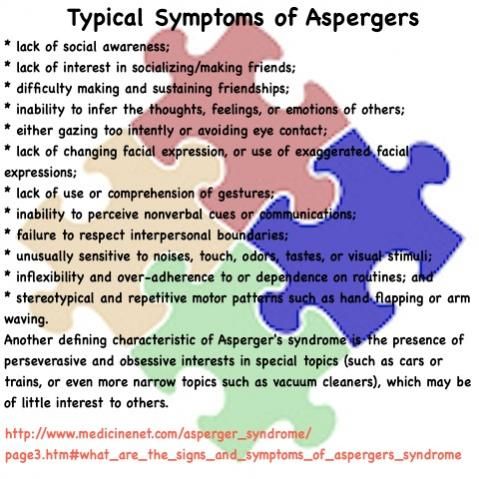
How can I help my child improve their problem solving skills today?
Read your child a simple story and ask them to identify the problem. Have a discussion about the different ways to solve the problem and what the most effective approach would be.
3. Teach your child to be self-aware
It’s important to help your child develop different strategies for coping emotionally. Self-awareness is an important part of managing emotions effectively. You can start by teaching children to correctly identify their feelings and emotions when in different situations. It’s also important to make sure your child knows how to manage these emotions so that anxiety and stress doesn’t trigger a meltdown.
How can I help my child be more self-aware today?
Show your child a picture and ask them to identify what it makes them feel. Once they’ve identified the emotion, ask them what other situations in their life make them feel this way.
4. Encourage your child to develop socially appropriate behavior
One of the best ways to help your child understand what appropriate behavior is, is to avoid criticism. Instead, find something positive to reward and praise your child for. This could be something as simple as the way your child is playing with their toys. The behavior you reward is what your child is most likely to repeat.
How can I help my child behave better today?
Challenge yourself to notice your child’s positive behavior and reward them for it. Perhaps they made eye contact during an interaction or didn’t shout. Draw your child’s attention to what they’re doing right.
5. Help your child develop a routine
Not unlike children with autism, those with Asperger’s Syndrome thrive on routine, structure and predictability. It’s up to parents to help their children develop a routine that remains unchanged from day to day.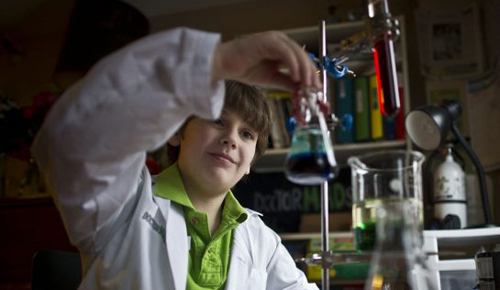 It’s a good idea to actively involve your child when deciding on the daily routine so that they feel part of the process. Be sure to factor in downtime and activities that will help your child manage transitions.
It’s a good idea to actively involve your child when deciding on the daily routine so that they feel part of the process. Be sure to factor in downtime and activities that will help your child manage transitions.
How can I help my child develop a routine today?
Some children respond well to seeing a written schedule. You may even want to create a daily chart which clearly outlines the day’s activities so your child knows what to expect. This makes it easier to stick to the routine and may even make it easier to plan for the unexpected.
It takes patience and understanding to raise a happy and well-adjusted child with Asperger’s Syndrome. It also requires the acceptance that no two children are alike. Your child’s condition does not define who they are. What parenting tips did you find most effective when raising your special child? Share your thoughts and suggestions in the comments below.
AngelSense is committed to creating a safer world for children with special needs. We designed the AngelSense GPS tracking solution to give parents the peace of mind that their child is safe at all times.
We designed the AngelSense GPS tracking solution to give parents the peace of mind that their child is safe at all times.
Asperger's Syndrome: Symptoms, Diagnosis and Treatment
Nationwide Children’s Hospital
Overview
Signs & Symptoms
Causes
Diagnosis
Treatment
Seeking Help
What is Asperger’s Syndrome?
Asperger’s Syndrome is a developmental disorder. Young people with Asperger’s Syndrome have a difficult time relating to others socially and their behavior and thinking patterns can be rigid and repetitive.
Generally, children and teens with Asperger’s Syndrome can speak with others and can perform fairly well in their school work. However, they have trouble understanding social situations and subtle forms of communication like body language, humor and sarcasm. They might also think and talk a lot about one topic or interest or only want to do a small range of activities. These interests can become obsessive and interfere with everyday life, rather than giving the child a healthy social or recreational outlet.
However, they have trouble understanding social situations and subtle forms of communication like body language, humor and sarcasm. They might also think and talk a lot about one topic or interest or only want to do a small range of activities. These interests can become obsessive and interfere with everyday life, rather than giving the child a healthy social or recreational outlet.
Boys are three to four times more likely than girls to have Asperger’s Syndrome. Most cases are diagnosed between the ages of five and nine, with some diagnosed as early as age three.
What Is the Difference Between Asperger’s Syndrome and Autism Spectrum Disorder?
The name for Asperger’s Syndrome has officially changed, but many still use the term Asperger’s Syndrome when talking about their condition. The symptoms of Asperger’s Syndrome are now included in a condition called Autism Spectrum Disorder (ASD). ASD is now the name used for a wide range of autism-like disorders. Some providers may still use the term Asperger’s Syndrome, but others will say “ASD – without intellectual or language impairment.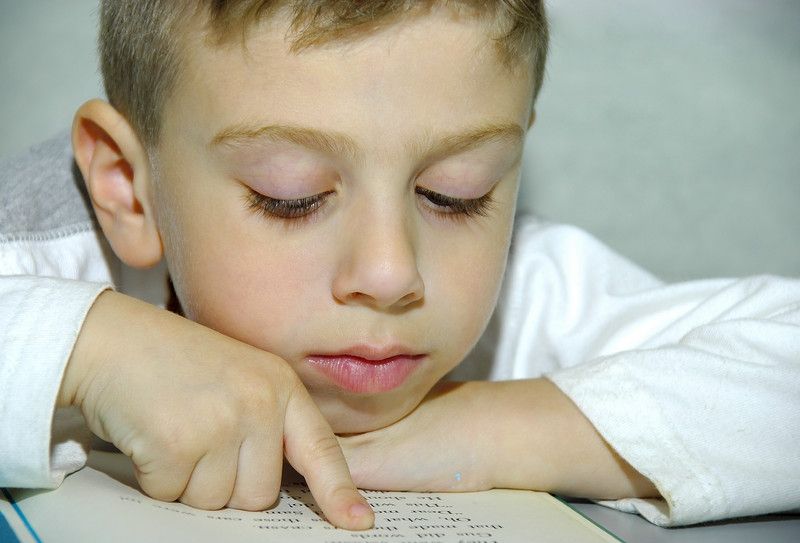 ” These two syndromes are, for the most part, the same.
” These two syndromes are, for the most part, the same.
What are the Symptoms of Asperger’s Syndrome?
Children with Asperger’s Syndrome exhibit poor social interactions, obsessions, odd speech patterns, limited facial expressions and other peculiar mannerisms. They might engage in obsessive routines and show an unusual sensitivity to sensory stimuli.
While all children with Asperger’s Syndrome are different, what sets them apart are their unusual social skills and obsessive interests. For a child with Asperger’s Syndrome, you may see one or more of the following symptoms:
- Inappropriate or minimal social interactions
- Conversations that almost always revolve around themselves or a certain topic, rather than others
- Not understanding emotions well or having less facial expression than others
- Speech that sounds unusual, such as flat, high-pitched, quiet, loud, or robotic
- Not using or understanding nonverbal communication, such as gestures, body language and facial expression
- An intense obsession with one or two specific, narrow subjects
- Becoming upset at any small changes in routines
- Memorizing preferred information and facts easily
- Clumsy, uncoordinated movements, including difficulty with handwriting
- Difficulty managing emotions, sometimes leading to verbal or behavioral outbursts, self-injurious behaviors or tantrums
- Not understanding other peoples’ feelings or perspectives
- Hypersensitivity to lights, sounds and textures
Children with Asperger’s Syndrome often show no delays in their language development.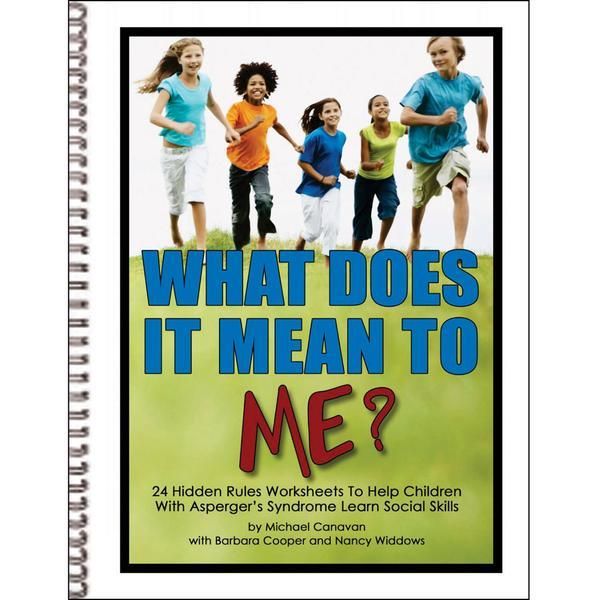 They are likely to have good grammar skills and an advanced vocabulary, but they also tend to be very literal. They have trouble using language in a social context.
They are likely to have good grammar skills and an advanced vocabulary, but they also tend to be very literal. They have trouble using language in a social context.
There may be no obvious delay in their cognitive development. Children with Asperger’s Syndrome can have problems with attention span and organization, but they usually have average intelligence.
What Causes Asperger’s Syndrome?
The causes of Asperger’s Syndrome are unknown. Genetics and brain abnormalities may be involved.
We do know that Asperger’s Syndrome is NOT the result of a child’s upbringing or poor parenting. Asperger’s Syndrome is a neurobiological disorder, meaning it is just a part of the child’s brain development, whose causes are not fully understood.
How is Asperger’s Syndrome Diagnosed?
As mentioned above, Asperger’s Syndrome is no longer diagnosed as a condition in and of itself. It is part of the range of conditions included in Autism Spectrum Disorder.
If a parent is concerned about a child’s social development, unusual language patterns, and odd behaviors, a pediatrician should be consulted.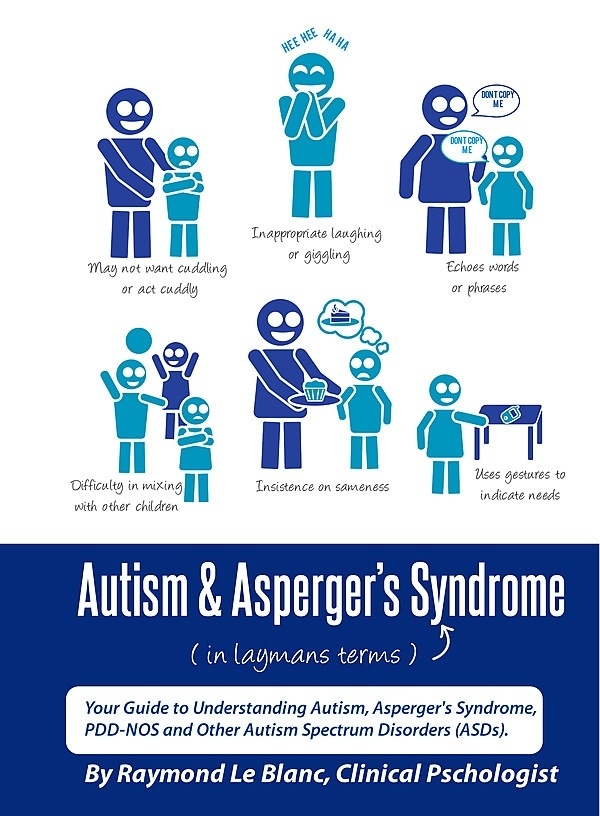 The pediatrician can determine if the child should be seen by a specialist, such as a developmental pediatrician, psychologist, or other clinician who is familiar with ASD.
The pediatrician can determine if the child should be seen by a specialist, such as a developmental pediatrician, psychologist, or other clinician who is familiar with ASD.
Testing and assessment usually involve a team of medical and psychological professionals. The specialists will ask the parent many questions about the child’s development and current skills and problems. They will also interact with the child and conduct assessments to evaluate what symptoms the child shows when interacting with others. They may also assess the child’s language and intellectual abilities. A medical doctor might ask questions or order tests to make sure there are no other medical concerns for the child.
Asperger’s Syndrome (also known as “Autism Spectrum Disorder - without intellectual or language impairment”) may be difficult to diagnose. Sometimes this condition can be confused with other conditions such as Attention Deficit Hyperactivity Disorder (ADHD), Obsessive Compulsive Disorder (OCD) or Oppositional Defiant Disorder (ODD). Making sure to evaluate the child’s social and communication skills, their patterns of behavior and thinking, and how these symptoms have developed over time will help the assessor provide the correct diagnosis.
Making sure to evaluate the child’s social and communication skills, their patterns of behavior and thinking, and how these symptoms have developed over time will help the assessor provide the correct diagnosis.
How is Asperger’s Syndrome Treated?
Because each case is different, treatment plans must be built according to each child’s needs. They should be adjusted over time as those needs change.
Treatment of Asperger’s Syndrome usually includes:
- Social skills training
- Behavior supports
- Cognitive behavioral therapy
- Parent education and training
- Speech-language therapy
- Occupational therapy
- Special education classes
- Medication
At present, there is no “cure.” By learning to cope with the symptoms and pick up on social cues, a child can learn to overcome some of the challenges he faces. With help, parents can learn how to best support their child. People with Asperger’s Syndrome can do well in school and go on to be contributing members of their community.
When Should I Seek Help?
Treatment should be done while a child's brain is still developing. If you notice signs of Asperger’s Syndrome or any of the symptoms of Autism Spectrum Disorder in your child, see your pediatrician. She or he can refer you to a mental health expert who specializes in diagnosing this type of disorder.
Related Conditions
- Autism Spectrum Disorder
Show More
You Might Also Be Interested In
Blog
Common Co-diagnoses Occurring with Autism Spectrum Disorder
People who have autism spectrum disorders (ASD) may also have additional health diagnoses (co-occurring conditions).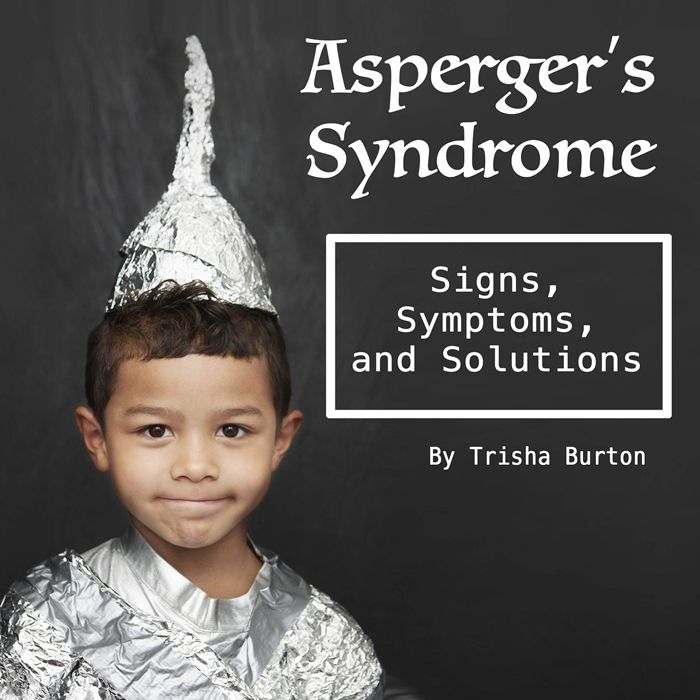 Learn more about these common conditions.
Learn more about these common conditions.
Blog
Autism Awareness Day: A Time for Acceptance and Action
April 2 marks the 11th annual World Autism Awareness Day – a day to recognize people living with autism.
Blog
Is Melatonin Safe for Kids?
For some children who need help falling asleep, melatonin has become a commonly recommended supplement. Melatonin is safe, effective and widely available.
Asperger's syndrome: how to help a child
home
reference Information
Resources for Parents
Asperger's syndrome: how to help your child
Asperger's Syndrome is a developmental disorder in which a child has problems with social communication and non-verbal communication. This disease differs from other manifestations of the autism spectrum in that there is a distortion of normal speech and problems with the development of intelligence.
This disease differs from other manifestations of the autism spectrum in that there is a distortion of normal speech and problems with the development of intelligence.
The disorder is named after Australian pediatrician Hans Asperger. In 1944, he published a paper in which he described four children who lacked non-verbal communication skills and had little understanding of the feelings of strangers. They did not understand how to show empathy for their peers. Because of these characteristics, it was difficult for children to integrate into society. Asperger gave this condition a name - "autistic psychopathy".
Symptoms
It is difficult for children with Asperger's syndrome to express themselves emotionally, they do not perceive gestures, facial expressions, voice intonations, it is difficult for them to choose a topic for conversation, to understand when a conversation can be started or ended, it is difficult for them to understand humor, sarcasm, allegories. Difficulties in communication affect social interactions. So, children with this pathology experience difficulties in communicating with other children, in maintaining relationships. In games, it is difficult for such children to accept a role, to show imagination. They prefer logical and mechanical games more. From the outside, these children seem clumsy, they can talk out of place, start inappropriate topics of conversation, get too close to strangers. Children with Asperger's Syndrome sometimes develop semantic dyslexia - reading without understanding the meaning of what is read.
Difficulties in communication affect social interactions. So, children with this pathology experience difficulties in communicating with other children, in maintaining relationships. In games, it is difficult for such children to accept a role, to show imagination. They prefer logical and mechanical games more. From the outside, these children seem clumsy, they can talk out of place, start inappropriate topics of conversation, get too close to strangers. Children with Asperger's Syndrome sometimes develop semantic dyslexia - reading without understanding the meaning of what is read.
Problems in social communication with peers - lack of non-verbal social behavior, which is required for social communication with each other. It starts with poorly developed verbal and gestural communication. It can develop to the complete absence of adequate facial expressions.
Stereotypical body movements, thoughtless use of objects or verbal constructions (for example, constant movements in the same ways, following patterns of behavior and movement, meaningless repetition of new words and phrases).
The lack of full communication with people in children in the future can lead to the development of clinical depression or anxiety neurosis. Therefore, parents should turn to specialists as soon as possible and begin psychological and pedagogical correction of a child with Asperger's syndrome, aimed at social adaptation.
Doctors of related specialties are involved in the diagnosis of Asperger's syndrome: a child psychiatrist, a psychologist, a child neurologist, a teacher-defectologist. First of all, an anamnesis is collected from the parents, as well as a conversation with the child in a playful way. The level of intelligence, psychoverbal development of the child and his ability to communicate are assessed.
The treatment of this syndrome is psychotherapeutic. The main task is to teach the child to live with this syndrome, to help him adapt to social life. Classes are held with a psychologist, teacher, speech therapist, neuropsychologist. The prognosis of the disease is favorable.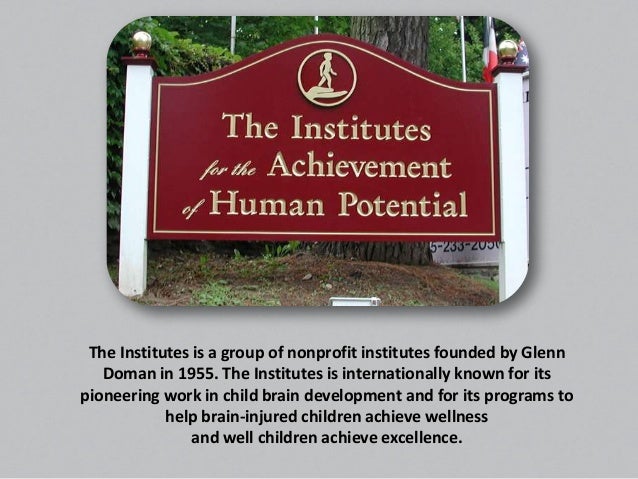 By adulthood, the symptoms of Asperger's syndrome subside and such people can have a full social life, work and create families.
By adulthood, the symptoms of Asperger's syndrome subside and such people can have a full social life, work and create families.
Share:
How can I help a child with Asperger's find friends?
05/20/14
Recommendations of an adult with Asperger's Syndrome Parents with this diagnosis
Author: Gavin Bollard
Translation: Elena Chernovskaya Source: Life with ASPERGERS
9000 9000 9000 9000 9000 9000 9000 9000 9000
"Who did you play with at school today?" is a common question from a mother, the answer to which was a muttering: “With no one…” And this is one of the most common problems that parents and their children with Asperger's face face.
Making friends is not easy, but maintaining friendship is even more difficult. Back in November, I wrote an article about my own experiences growing up and making friends, but this time I want to offer some tips and tricks for parents whose kids have trouble making friends.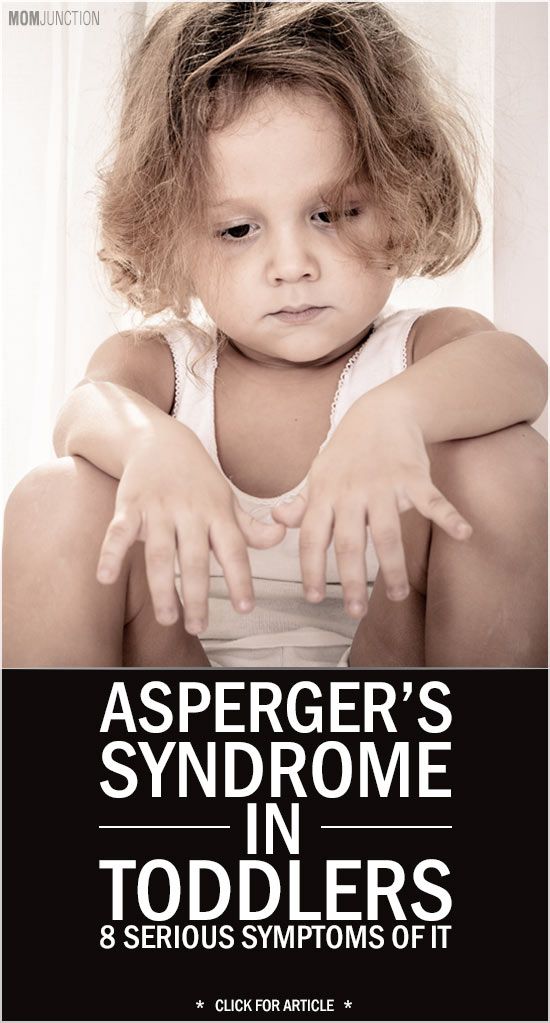
How to recognize a friend
Friendship is preceded by a series of steps that are not instinctive for children with Asperger's syndrome. The first step to friendship is recognition, a step that consists of two parts - recognizing the face and remembering the name. The first part is usually straightforward, although some children do not recognize faces at all, and some have difficulty recognizing when others change their hairstyle or other aspects of appearance. There were times in my childhood when I didn't realize that the kid I befriended a year ago was the same boy who had just come up and talked to me.
Sometimes my mother had to step in and say, “Don’t you remember Aaron, you played football with him all last year…” Sometimes I would say, “No, it was a different Aaron,” but her words made me think and often her clues gave me the opportunity to renew the friendship.
Remembering a name is much more difficult, and it is not uncommon for some children to be unable to remember their teacher's name for several months, let alone the names of their classmates.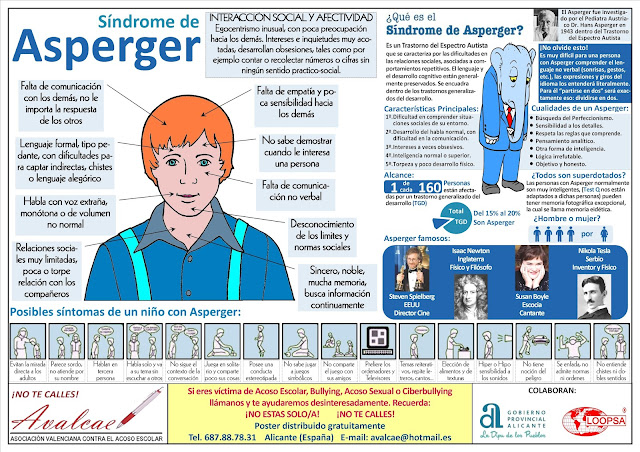 A particular problem for me was that I was always very careful with the names, so I did not even risk saying them. I may well have known the name of the teacher, but I never said his name out loud, so as not to be mistaken.
A particular problem for me was that I was always very careful with the names, so I did not even risk saying them. I may well have known the name of the teacher, but I never said his name out loud, so as not to be mistaken.
It took a while for my mother to realize this, and eventually she began to speak and write down the names of my teachers for me until I felt more confident.
Why names are important
One of the most annoying things that can happen is when you can't say someone's name. My youngest son played with one boy every day in kindergarten. They were great friends and apparently this boy used to talk about my son at home every day, calling him by his first name. One day, when my wife was picking him up, she asked the boy's name, and our son replied, "I don't know!" This caused a very emotional reaction from the boy's mother, who was standing nearby.
Apparently, their family had repeatedly heard the name of our son at home, and he himself did not even know the name of his friend. The boy's mother did not understand that our son does not need a name to maintain a strong friendship with someone.
The boy's mother did not understand that our son does not need a name to maintain a strong friendship with someone.
Memorizing names
One good exercise is to use school pictures to help your child remember names. It is helpful to keep copies of these photos near where you and your child do homework and discuss things at school; or perhaps even next to the dining table. Set a goal to memorize one or two names per evening. Do it in the game, as if by accident, not intentionally. So the child will learn to associate names and faces, and not just memorize the list. For best results, start by asking your child who they are playing with, who is in their class. You can also ask him to point to photos of bullies or children who have similar interests to him.
Remembering names and associating them with faces is an important step in building friendships.
Hello! My name is…
— Hello! It's you...
Common Interests
One of the best ways to help your child with Asperger's make friends is to find children with similar interests. To make this process easier, invite your child to bring something related to their interests. For example, if he loves football or a particular football team, then try to send him to school with "signature" items like pencil cases, book covers, and if uniforms are not a requirement at your school, offer themed clothing. But make sure everything is age appropriate. Sending a 14-year-old to school with a "SpongeBob" insignia can attract unwanted attention from bullies.
To make this process easier, invite your child to bring something related to their interests. For example, if he loves football or a particular football team, then try to send him to school with "signature" items like pencil cases, book covers, and if uniforms are not a requirement at your school, offer themed clothing. But make sure everything is age appropriate. Sending a 14-year-old to school with a "SpongeBob" insignia can attract unwanted attention from bullies.
When your child comes home, ask them who noticed these brand differences, and try to look for positive and/or repeat comments. Your child may need a little help from you, so be ready to support him by offering to talk to any child who shows interest in him.
Arranging Game Meetings
If a common interest becomes apparent, consider organizing a game meeting or going somewhere together on the weekend. If your child is unable to communicate successfully, you can contact teachers for help. The teachers will not be able to give you the other child's phone number, but they will give you your number because they have given you permission.
When arranging a play date, make sure that only one child comes to visit. Inviting two friends at once carries the risk that two visitors will play with each other without your child. If you have two kids, it's best to invite two friends over to avoid one of your kids playing with a friend meant for the other.
If you're hosting a fun activity away from home, try to choose a location where there aren't other kids—or at least a chance of meeting a mutual friend. The parks, for example, are full of other kids, and all of this can lead to other kids who randomly play nearby.
Be sure to invite the other child's parents so that they can also attend. Some parents leave the child and run away, others find it necessary to keep a close eye on their child in a new situation. This is especially true when it comes to children of different sexes. It may seem unusual, but if you have a boy who has no friends, then it is better to make friends with a girl than not to have friends at all.
